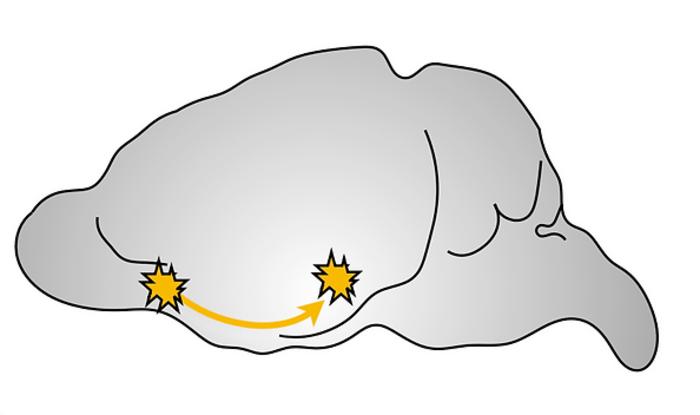Have you ever noticed how you can suddenly hear your refrigerator humming in the background when you focus on it? Or how the sound of your name instantly catches your attention even in a noisy crowd?

Credit: Melissa Caras
Have you ever noticed how you can suddenly hear your refrigerator humming in the background when you focus on it? Or how the sound of your name instantly catches your attention even in a noisy crowd?
The human brain is remarkably adept at adjusting what we hear based on contexts, like our current environment or priorities, but it’s still unknown how exactly the brain helps us detect, filter and react to sounds.
Now, biologists at the University of Maryland are a step closer to solving that mystery. Using an animal model, the researchers found that the orbitofrontal cortex (OFC), a brain region associated with decision-making but not typically linked to hearing, plays a central role in helping the auditory cortex (a primary hearing center of the brain) adapt to changing contexts or situations. The team’s findings were published in the journal Current Biology on July 11, 2024.
“Our hearing doesn’t just depend on the sounds around us. It also relies heavily on what we’re doing and what’s important to us at that moment,” explained UMD Biology Assistant Professor Melissa Caras, the paper’s senior author. “Understanding the neural mechanisms responsible for these adjustments can also lead to a better understanding of and potential treatments for neurodevelopmental disorders like autism, dyslexia or schizophrenia—conditions where sensory regulation goes awry.”
To closely examine the brain circuitry involved in the hearing process, the researchers turned to gerbils, small mammals whose basic hearing system is similar to that of humans. The animals were exposed to sound patterns in two different contexts. In one context, the animals listened to sounds passively without needing to do anything. In the other, the animals had to perform a specific action in response to the sounds they heard. By recording and manipulating the brain activity of the animals, the team discovered that the OFC helped the animals switch between passive and active listening.
“In short, the OFC sends signals to the auditory cortex when it’s time to pay closer attention to sounds,” Caras said. “It’s not certain whether the signals are sent directly or indirectly via an intermediary brain region, but we do know that activity in the OFC is essential to how the gerbils behaved in our experiments.”
When the OFC was silenced, the animals’ auditory cortex did not switch between passive and active listening, impairing their ability to pay attention to and react to a behaviorally relevant sound.
“In terms of a more human-oriented analogy, it would be as if I told you to suddenly pay attention to your refrigerator humming in the background,” Caras explained. “If your OFC was silenced and unable to send a signal to your auditory cortex, you might have difficulty doing so because the ability to rapidly alter your sound perception would be impaired.”
While this study was conducted in animals, Caras says the findings may have notable implications for human health and well-being. The ability to quickly shift attention to important sounds is essential for many day-to-day activities including communicating with others and navigating busy or dangerous environments.
“We’re just beginning to understand how the brain fine tunes hearing sensitivity in response to sudden shifts in behavioral contexts. We plan to explore exactly how the OFC communicates with the auditory cortex and see whether it’s possible to strengthen the connection and improve hearing ability,” Caras said. “This work is paving the way for researchers and health care professionals to develop better strategies for improving hearing in both healthy individuals and those with sensory impairments.”
###
This research was supported by the National Institutes of Health (Award Nos. R00DC016046 and R01DC020742).
The paper, “Orbitofrontal Cortex Modulates Auditory Cortical Sensitivity and Sound Perception in Mongolian Gerbils,” was published in Current Biology on July 11, 2024.
Other co-authors of the paper from UMD’s Department of Biology include current postdoctoral associate Matheus Macedo-Lima and former postdoctoral associate Lashaka Hamlette.
Journal
Current Biology
DOI
10.1016/j.cub.2024.06.036
Method of Research
Observational study
Subject of Research
Animals
Article Title
Orbitofrontal Cortex Modulates Auditory Cortical Sensitivity and Sound Perception in Mongolian Gerbils
Article Publication Date
11-Jul-2024




